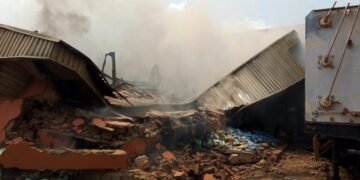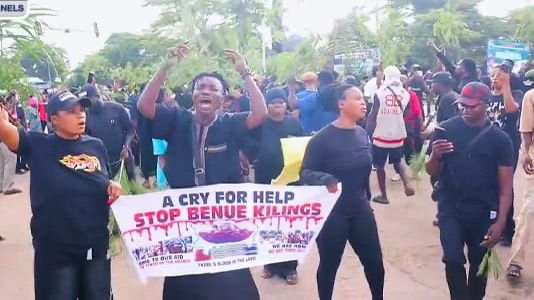-By Ruben Mario Brodrick
MAKURDI, Nigeria –
The “Food Basket of the Nation,” Benue State, has once again become a tragic landscape of death, with the Catholic Secretariat of Nigeria (CSN) issuing a searing indictment of the Nigerian government following the reported slaughter of over 200 people in the latest wave of violence.
The CSN’s editorial paints a grim picture of a “valley of blood” reopening its veins, condemning what it describes as a long-running “genocide” that the Nigerian state appears to tolerate.
The recent massacre, which extinguished more than 200 lives, is not an isolated incident but the latest in a series of unchecked atrocities that have plagued Benue State for years. The CSN emphasizes that the victims are not mere statistics, but individuals – fathers, mothers, sons, daughters, elders, and children – all Nigerian citizens “slaughtered in their homeland without war, neither in an earthquake, nor as a result of an epidemic.”
The editorial sharply criticizes the government’s response, which it characterizes as wavering between “feigned concern and deadly indifference,” with “fleeting headlines and political comments” replacing decisive action. It decries the Ministry of Agriculture’s call for prayer and fasting in response to food deficits, rather than addressing the insecurity that keeps farmers from their land.
A Decade of Carnage:
A Haunting Timeline
The CSN provides a chilling chronology of massacres in Benue, highlighting the systematic nature of the violence:
- February 21, 2016: Over 500 people butchered in Agatu in one of Nigeria’s most savage attacks.
- January 1, 2018: 73 persons murdered in coordinated attacks across Guma and Logo Local Government Areas.
- March 5, 2018: 26 mourners gunned down during a burial ceremony in Mbalom.
- April 24, 2018: Two Catholic priests, Rev. Fathers Joseph Gor and Felix Tyolaha, killed alongside 17 parishioners during early morning Mass at St. Ignatius Catholic Church in Ayar-Mbalom. The assailants reportedly returned later to burn over 60 houses.
- May 2021: 36 people, mostly university students, slaughtered in Shikaan, Mbagena-Kpav, Katsina-Ala LGA.
- April 7, 2023 (Good Friday): 136 persons killed in Umogidi, Apa LGA, and nearby communities.
- June to October 2022: Gbeji, Ukum, and Logo communities experienced repeated attacks, leading to over 200 deaths in just four months.
- January 2023: Fresh killings erupted in Akpuuna and Diom communities of Ukum, with dozens more buried in mass graves.
- June 2025: Over 200 civilians murdered in the latest tragedy.
The CSN firmly rejects euphemisms like “herder-farmer clashes,” “ethno-religious tension,” and “communal misunderstandings,” labeling them as a “cowardly whitewash” and an “insult to the dead.” The truth, they assert, is that “this is terrorism. It is systematic, deliberate, and sustained.” They question why the Nigerian government has refused to officially designate the assailants as terrorists, despite the scale and structure of their operations.
Devastating Toll and Government’s Failure
The scale of devastation is staggering. Over the last decade, the death toll in Benue State alone is estimated to have exceeded 5,000, with over 1.5 million persons internally displaced, according to reports by Amnesty International and the Internal Displacement Monitoring Centre (IDMC). Numerous towns have been razed and rebuilt repeatedly, crops destroyed, schools deserted, and places of worship desecrated. By 2021, Benue had recorded at least 14 major mass killings, yet not a single conviction against perpetrators has been secured.
The CSN directly challenges the government’s adherence to Section 14(2)(b) of the Nigerian Constitution, which declares that “the security and welfare of the people shall be the primary purpose of government.” This sacred charge, they argue, has been not only neglected but “profaned.”
Condolence visits and press statements have replaced decisive actions and justice.
Voices of Dissent and International Calls for Action
The editorial highlights the plight of those who dare to speak out, noting that Bishop Wilfred Chikpa Anagbe of the Catholic Diocese of Makurdi has faced threats for persistently raising the alarm and exposing the government’s silence. Bishop Anagbe has publicly declared that the killings are part of an orchestrated attempt to exterminate the indigenous people of Benue.
Meanwhile, Pope Francis had condemned the violence and urged the Nigerian government to act. The Catholic Bishops Conference of Nigeria (CBCN) has issued at least six communiqués since 2016, condemning the killings and demanding justice, but their calls have been largely ignored. The bishops, who wield moral authority, have warned that when the state abandons its constitutional role, the people may be forced to defend themselves.
Unanswered Questions and a Call to Conscience
The CSN poses pointed questions to the government: “why is the government refusing to name them and overcome them?” Is it fear of losing political capital, complicity, or ethnic solidarity outweighing constitutional duty? They argue that when the state fails to defend the defenseless, it becomes a “co-conspirator” in their demise.
The editorial concludes with a powerful clarion call to all Nigerian citizens, civil organizations, professional bodies, ethnic groups, and religious bodies: “To remain silent is to join the slaughter.
To rationalise it is to empower the killers. To minimise it is to betray our shared humanity.” They warn that a nation tolerating mass murder in one region lays the foundation for its spread to all others.
The CSN demands accountability, not condolences; decisive action, not diluted speeches. “Nigerians demand justice, not a recycling of euphemisms. And they demand it now, not tomorrow, because even the earth is tired of drinking innocent blood.”


















































